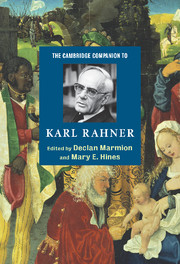Book contents
- Frontmatter
- Introduction
- Part I Spiritual, Philosophical, and Theological Roots
- Part II Theological Investigations
- Part III Conversations Ongoing
- 12 Rahner amid modernity and post-modernity
- 13 Rahner’s reception in twentieth century Protestant theology
- 14 Karl Rahner
- 15 Rahner and religious diversity
- 16 Political and liberation theologies
- 17 Feminist theologies
- Part IV Retrospect and Prospect
- Appendix
- Index
17 - Feminist theologies
from Part III - Conversations Ongoing
Published online by Cambridge University Press: 28 May 2006
- Frontmatter
- Introduction
- Part I Spiritual, Philosophical, and Theological Roots
- Part II Theological Investigations
- Part III Conversations Ongoing
- 12 Rahner amid modernity and post-modernity
- 13 Rahner’s reception in twentieth century Protestant theology
- 14 Karl Rahner
- 15 Rahner and religious diversity
- 16 Political and liberation theologies
- 17 Feminist theologies
- Part IV Retrospect and Prospect
- Appendix
- Index
Summary
If the title of this essay is taken at face value, by all rights it should be very short. While Rahner's life spanned the twentieth century, with the rapid and irreversible change that century has brought to our understanding of “female, ” Rahner's observations about the changing status of women do not refer to the movement of feminist theology, a movement that was well underway by the time of his death in 1984. At the outset, then, we must state clearly that Karl Rahner was not a feminist (indeed, not even an “anonymous” one). Nevertheless, Rahner's twin expositions of the hearer of the word and the mystery of God, his searching method, and, perhaps most importantly, his insistence that these ground a dynamic re-framing of the Christian, and particularly the Roman Catholic, tradition, have proven to be a rich resource for Catholic feminists.
Following the vision of Vatican II, and responding to the needs of a church faced with rising numbers and declining vocations, an unprecedented wave of lay women and men began graduate-level study in theology in the 1970s, readying themselves for a variety of positions in parish ministry and education. Many of those studying were women, women who were experiencing simultaneous social and ecclesial revolutions. For many of these, Rahner’s voice shaped their theological study, providing a theological framework for questions about doctrinal change, masculine symbolism, and the status of the human person before God, as well as a pastoral voice that took seriously their experience of profound change, with its shock of freedom and decision.
- Type
- Chapter
- Information
- The Cambridge Companion to Karl Rahner , pp. 264 - 278Publisher: Cambridge University PressPrint publication year: 2005
- 12
- Cited by

